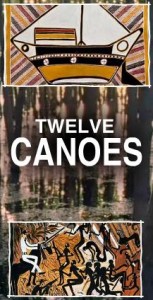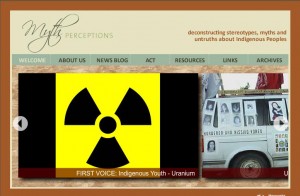New South Wales Aboriginal Ed
Here’s a site from the New South Wales Government in Australia. It is dedicated to Aboriginal Education. It provides examples of context-based teaching and learning projects to be used. It is obvious that the values of the Aboriginal people are considered. They address Aboriginal art and languages, and contextualize math, science, and literature for the students.
October 11, 2010 No Comments
12 Canoes
I found this site that is to educate people about the Yolngu people of Ramingining in Australia’s Northern Territory. The website is a great use of technology and educating others. They have provided a study guide for teachers and students. It is quite interactive and divides up the culture so that you can explore the art, music, the people, etc. It shows what is important to the people in a very easy to follow way.
October 11, 2010 No Comments
Landmark accord on the Education of Indigenous Peoples in Canada to be Signed at Congress 2010
I came across the attached document and found it to be of highly relevant to our current course readings. Here is an excerpt of the announcement of the accord document to be signed at Congress:
“Montreal/May 31, 2010 – A landmark agreement on the education of Indigenous peoples in Canada will be signed June 1, at the Congress of the Humanities and Social Sciences hosted by Concordia University in Montreal. The Accord on Indigenous Education provides for a new framework under which university programs will be reviewed and partnerships with Indigenous communities forged in order to better reflect the educational purposes and values of Indigenous people. It will lead to the development of teaching methods that respect –and, indeed reflect‐ the specific cultural needs and references of First Nations people.
The agreement was developed between leading representatives of First Nations communities and The Association of Canadian Deans of Education (ACDE), which is meeting at Concordia during the 2010 Congress of the Humanities and Social Sciences, continuing through June 4.”
This accord gives one hope. I’ve attached the full announcement here:
media release-Congress Indigenous Signing (3)[1]
For the full Accord document, navigate to: http://experience.congress2010.ca/wp-content/uploads/2010/05/Congress-Indigenous-Accord.pdf
October 7, 2010 No Comments
Aboriginal Canada Portal – Teacher Resources
http://www.aboriginalcanada.gc.ca/acp/site.nsf/eng/ao31045.html
I realize that the Aboriginal Canada Portal has been mentioned a couple of times, but the content that interested me at this site was the Resources for Teachers page. The many resources are divided into two sections – Educational Resources and Lesson Plans and Activities. I even noticed a document from UBC’s Faculty of Education – a grade 12 unit lesson plan on Aboriginal Elders.
One of the resources listed is GoodMinds.com, which is a source for educational resources for Native American, First Nations, Indigenous and Aboriginal Studies. I have purchased literacy materials from them in the past for the classroom. There are so many links here that it will take awhile to get through them.
September 27, 2010 No Comments
Classroom English will be the death of Aboriginal languages
This Australia-based article discusses concerns around reducing the amount of time spent teaching in the local (Aboriginal) language down to a mandated one hour/day. Several reasons for doing so are listed, including the argument that Aboriginal employment is very low because education levels are very low because education is primarily conducted in English. It is argued that forcing students to learn in English will increase English literacy rates along with providing students with an education.
The author of this article disagrees with this strategy, noting that there are flaws in the logic, including the fact that low education levels are not the only reason for low employment. There are other reasons that can be cited, such as bureaucratic regulations requiring completion of literacy courses prior to gaining access to certain jobs.
Some of the areas of concern cited for moving to a one hour a day education in English are:
- Poor attendance will likely become lower
- Parental support may drop
- Turnover of teachers may increase
- Indigenous languages are further at risk
The article goes on to discuss the importance of preserving Aboriginal languages.
For those interested, several responses to the article follow it.
http://www.crikey.com.au/2008/11/20/classroom-english-will-be-the-death-of-aboriginal-languages/
September 25, 2010 1 Comment
Alberta’s Information Connection
The University of Alberta has put together the “First Nations Information Connection” . You will be able to find articles, journals, books, and other publications through this site. Most of the resources are freely accessible and easy to find.
September 19, 2010 No Comments
MythPerceptions
Myth Perceptions is a site that I came across that might help people understand First Nations culture better. Many people (not necessarily those taking this course) but cultural misconceptions and stereotypes exist (regardless of the culture). This site provides information to demystify those ideas. It also presents issues that First Nations people face.
September 19, 2010 No Comments
Tradition and Literature
I came across the “Using First Nations Traditional Literature in the Classroom” site. It is created by the Saskatoon Public Schools Online Resources Centre. It provides educational resources to teachers. There are outlined activities for oral tradition, examining folklore, and story-telling. These are all important aspects to First Nations culture. This site helps to keep those alive for students and teaches them about those traditions. This can be useful to help educators incorporate tradition and culture into the classroom.
September 19, 2010 No Comments
What I Learned In Class Today
http://www.whatilearnedinclasstoday.com/
Aboriginal issues have become an important issue at UBC, and part of it is the work done by “What I Learned in Class Today: Aboriginal Issues in the Classroom,” which is a research project that explores difficult discussions of Aboriginal issues that take place in classrooms at UBC. It can be said that through this project by two UBC students, Karrmen Crey and Amy Perreault, that UBC has focussed much more on the challenges of aboriginal students in university. In 2009, it released its Aboriginal Strategic Plan to better understand and support students of aboriginal ancestry on campus and also studies about this very important topic. Developed in the First Nations Studies Program at UBC, this project examines the experiences of students, instructors, and administrators at the university to make these problems visible, better understand how difficulties arise, and to find ways to have more professional and productive classroom discussions.
Students frequently report troubling and sometimes traumatic discussions of cultural issues in class. These situations often affect their ability to function in their coursework, and even their ability to return to class. Using technology as its main platform, the project looks at how the challenges around talking about race work as an educational barrier at the classroom level. Not sufficiently addressed in educational institutions, and yet, desperately needing attention & to be discussed, video interviews of students, instructors, and reactions from viewers to the videos are carefully displayed on the website as a digital tool for study and research. In doing so, the project works to improve the conversations around politically and culturally sensitive issues in a classroom by asking: how does cultural communication happen in a classroom, and how can it be improved? This goes to show that technology isn’t just neutral — it can be used to create change. For the better.
This project has generated quite a bit of public attention, including articles online at CBC and Rabble.ca. I’m glad it has, for the better!
http://www.cbc.ca/aboriginal/2008/06/what_i_learned_in_class_today/
September 15, 2010 No Comments



